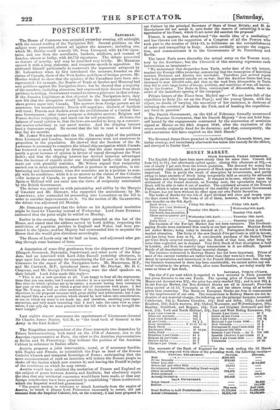POSTSCRIPT.
SATURDAY.
The House of Commons was occupied yesterday evening, till midnight, with the second reading of the Navigation Bill. Several petitions on the subject were presented, almost all against the measure; including one, which Mr. Herries could scarcely lift, from Liverpool, with 24,700 signa- tures, and one from the merchants, bankers, artificers, and seamen of London, almost as bulky, with 20,759 signatures. The debate presented no feature of novelty, and may be described very briefly. Mr. liaamEs opened it with a long, elaborate, and temperate speech in opposition. He addressed himself particularly to controvert the arguments advanced by Mr. Labonchere when he first introduced the measure, founded on the claims of Canada, those of the West Indies, and those of foreign powers. Mr. Herries wished to show that the opinions of the Canadians have been mis- represented: for example, the Boards of Trade at Quebec and Montreal had sent petitions against the Navigation-laws; but be showed that a majority of the members, including absentees, had expressed their dissent from those petitions in writing. Government wanted to nurse a grievance in that colony. If the Jamaica Legislature at first objected to the Navigation-laws, they now felt that the abrogation would facilitate the importation of foreign slave-grown sugar into Canada. The answers from foreign powers are all courteous, but unsatisfactory : Russia will negotiate; Gioberti of Sardinia will treat; Prussia and Austria await the establishment of a Central Ger- man Government; other states postpone a definitive answer; Belgium and France decline reciprocity, and stand out for self-protection. At home, the balance of naval opinion is, that the laws are needed to keep up a commer- cial marine subsidiary to our naval marine. And the shipping interest loucLy deprecates repeal. He moved that the bill be read a second time that day six months. Mr. JAMES WILSON advocated the bill. He made light of the petitions from Liverpool and London, because the signatures were not numerous in proportion to the population. He showed that the freedom of the St. Lawrence is necessary to complete the inland ship navigation which Canada has bestowed so much money in forming; that the most recent accounts testify a great increase of opinion in favour of repeal throughout the West Indies; and that the shipping interest has derived immense advantages from the increase of exports under our liberalized tariff,—this last point made out with plentiful statistics. Mr. Wilson argued that reciprocity carried out in strict equivalents, whether in produce or navigation, is em- barrassing and inconvenient; since few countries are in a position to com- ply with its conditions; while it is no answer to the claims of the Colonies —for instance of Canada, to grant freedom of the St. Lawrence—that Spain or Holland will not enter into the views of reciprocity entertained by the British Government. The debate was carried on with painstaking and ability by the Marquis of GRANBY and Mr. HENLEY, who supported the amendment; by Mr. CARDWELL, who contended for proceeding into Committee on the bill in order to consider improvements on it. On the motion of Mr. GLADSTONE, the debate was adjourned till Monday.
Mr. DISRAELI requested that the debate on his Agricultural resolution might be fixed for Thursday instead of Wednesday. Lord JOUR RUSSELL intimated that the point might be settled on Monday.
Earlier in the evening, Sir GEORGE GREY attended at the bar of the House, and stated that the address moved by Lord Ashley, respecting the subdivision of populous parishes in England and Wales, had been pre- sented to the Queen; and her Majesty had commanded him to acquaint the House that she would give directions accordingly.
The House of Lords only sat for half an hour, and adjourned after get- ting through some beefiness of form.


























 Previous page
Previous page